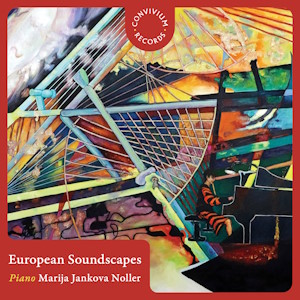
European Soundscapes
Marija Jankova Noller (piano)
rec. 2023, Concert Hall, Faculty of Music, Cambridge University, UK
Convivium Records CR099 [2 CDs: 134]
Pianist Marija Jankova Noller comes from Plovdiv in Bulgaria. She went to Germany in 1980 for a post at a school for prodigiously talented children. She is a sought-after recitalist, but this seems to be her debut recording, curious given her peerless playing here. It appears that she wanted to record her favourites, and it is a fascinating recital.
I will comment on my standouts in the programme. Bulgarian Lyubomir Pipkov’s Sounds of Spring give folk rhythms a contemporary twist, in the manner of Grieg, Bartók, Kodály and many others. I think the selection is played more insightfully than Dobromir Tsenov does in the complete set on Toccata (review).
Next come two of George Benjamin’s superb miniatures Piano Figures, and Olivier Messiaen’s Première communion de la Vierge (from Vingt regards sur l’enfant Jésus), which the pianist makes sublimely transcendent as befits both subject and music. The seventh of Georges Aperghis’s The elemental secrets makes a brief appearance with its fragile beauty. Jankova Noller plays Joaquin Turina’s Radio Madrid to bring out the best of this clever piece, which combines comic elements with brilliant glimpses of Spanish folk music.
Leoš Janáček wrote the Sonata 1.X.1905 as a tribute to a young carpenter, František Pavlík, bayoneted to death at a demonstration to demand a Czech university in Brno, Moravia. Jankova Noller’s insightful performance beautifully conveys the seriousness of the sonata. She plays with a measured meter and wonderfully judged pauses, to emphasise the horror at an appalling, undeserved and unnecessary death.
In George Enescu’s Carillon nocturne from Suite No 3, the pianist makes the instrument sound magically bell-like – the quality of playing is quite a promise for the second disc.
Jankova Noller’s perfect playing makes Haydn’s Variations in F minor sound particularly and preciously delicate. In contrast, there followed robust yet subtle playing in Bartók’s Suite Op 14, particularly required in the last two movements, Allegro molto and Sostenuto. Robust playing was also called for in Prokofiev’s Suggestion diabolique – and she gave us an especially fiendish performance.
The programme ends with a piece by another Bulgarian. The title of Vassil Kazandjiev’s The Triumph of the Bells sounds well deserved under the pianist’s fingers, tiny bells and the largest bells. She fairly renched the sound from the depths of the piano in a fittingly declamatory finish to the set.
Fifteen countries are represented on twenty-six tracks, each played to bring out the nuances. That makes for a thoroughly enjoyable two-odd hours of listening. The recording engineer Myles Eastwood deserves huge credit for the excellent sound. One hopes that Marija Jankova Knoller will return to the studio again, perhaps to explore more of her native Bulgaria’s music.
Steve Arloff
Availability: Convivium Records
Contents
Lyubomir Pipkov (1904-1974)
Frühlingsklänge (Sounds of Spring)
George Benjamin (b. 1960)
Piano Figures
Olivier Messiaen (1908-1992)
Première communion de la Vierge (from Vingt regards sur l’enfant Jésus)
Georges Aperghis (b.1945)
Les secrets élémentaires (No 7)
Joaquín Turina (1882-1949)
Radio Madrid
Jean Sibelius (1865-1957)
The Lonely Pine
Gioacchino Rossini (1792-1868)
Marche et Réminiscences pour mon dernier voyage (from Péchés de vieillesse)
Leoš Janáček (1854-1928)
Piano Sonata 1.X.1905
George Enescu (1881-1955)
Carillon nocturne (from Suite No 3)
Joseph Haydn (1732-1809)
Variations in F minor
Ludwig van Beethoven (1770-1827)
Piano Sonata No 30 in E major, Op 109
Frédéric Chopin (1810-1849)
Ballade No 1 in G minor, Op 23
Béla Bartók (1881-1945)
Suite, Op 14
Sergei Prokofiev (1891-1953)
Suggestion diabolique
Vassil Kazandjiev (b.1934)
Triomphe des carillons (The Triumph of the Bells)


















